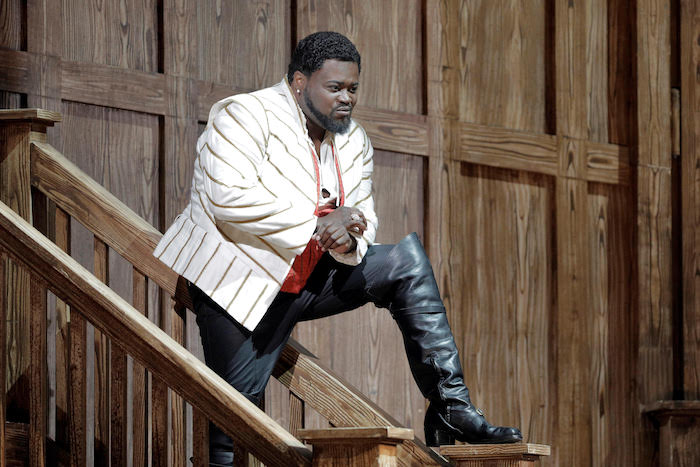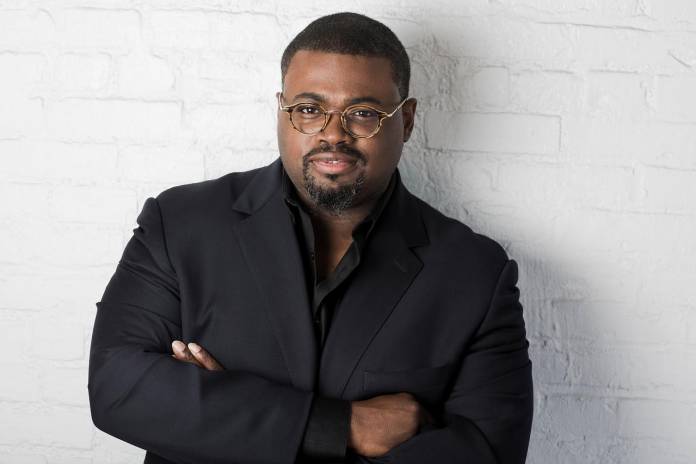ALL EARS When opera singer Joy Davidson heard tenor Russell Thomas sing in his high school choir in Miami, she asked him if he’d ever considered voice lessons. Thomas didn’t understand right away what a big deal that was.
“I thought that meant something was wrong with my voice,” said Thomas, who was at the opera house after a rehearsal. “She said, ’No, that means you have something to work with.’”
Thomas did work with his voice, and now he’s a rising star in opera: The New York Times called him “a tenor of gorgeously burnished power.” He just sung the title roles in Otello at the Hollywood Bowl and La Clemenza di Tito at the Salzburg Festival with Peter Sellars.
He’s in town, again for a title role, this time in the San Francisco Opera’s Roberto Devereux (through September 27).
Thomas didn’t learn about opera through his family or friends. He found it on his own, when he was eight years old, and after school was turning the dial on the radio and heard someone singing.
“That voice, and how they could make that sound intrigued me,” he said. “I wanted to know how that happened.”
Every day when he came home from school, Thomas would search for opera on the radio. He didn’t even think about being a singer then—that seemed too far away. But his choir teacher in high school got dress rehearsal passes for students to go to the opera. Once he saw the singers on stage, he knew that was what he wanted to do.
“The first one I saw was Carmen, with all the passion and the drama,” he said. “Opera has everything: visual arts, drama, music, singing, and literature. It’s the only art that has absolutely everything.”
Davidson became his voice coach, giving him lessons for free when he couldn’t afford to pay for them. She told him if he auditioned, he would get accepted to every school, and they would offer him a full scholarship. And they all did. He went to the school where Davidson was teaching, New World School of the Arts in Miami. In college, he auditioned for the chorus of the Florida Grand Opera. The choir director told him he needed to take it seriously—he says he was a bit of a party kid—and then he could make it a career.
Thomas says although the subjects in opera often aren’t regular people (such as in Roberto Devereux, which tells the story of Queen Elizabeth I and her ex-lover, the Earl of Essex) we all understand the emotions in opera.
“Everybody can relate to loving someone and losing love and being angry,” he said. “Opera is dealing with things all human beings feel and go through.”
Thomas would like to see more inclusivity in opera. And he thinks that starts with where decisions are made.

“There’s a lack of diversity generally in the office,” he said. “And because that’s what you know, the first person that’s going to come to your mind to play a role is not going to be someone who doesn’t look like you. This is a problem we have in classical arts. Yes, we’ve had great famous African American opera singers—Leontyne Price, Jessye Norman, George Shirley—but they’re fewer African Americans stars in opera today than in the ’60s and ’70s.”
When opera companies post pictures of their young artists, often all of them, or nearly all, are white, Thomas says.
“Arts institutions should look like their communities, and often times they don’t,” he said. “So the stage doesn’t look inclusive, and then the audience isn’t inclusive. Minority groups will go and support something when they see other minorities onstage.”
Thomas says in Los Angeles when he performed Otelo, the audience was diverse.
“They see someone who looks like them, then they’re interested in what’s going on,” he said. “When I did Otello in Atlanta, three of the main cast members were black and the audience was full of black people. They said they don’t usually see that in the audience, but you would if you thought a little more about this, and not just in Porgy and Bess.”
Thomas is hoping that companies will pay attention to who makes up their cast, and not only during Black History Month. He mentions Sellars, who he has worked with several times, and who recently did the libretto for composer John Adams’ Girls of the Golden West at the San Francisco Opera.
“You look at what Peter Sellars did there, and this is in every show he does,” he said. “It’s never just all white people on the stage. He makes a concerted effort to show that these people can be black or Asian or Latino, and the world needs more people like him for the survival of classical art.”
ROBERTO DEVEREUX
September 8-27
San Francisco Opera
Tickets and more info here






